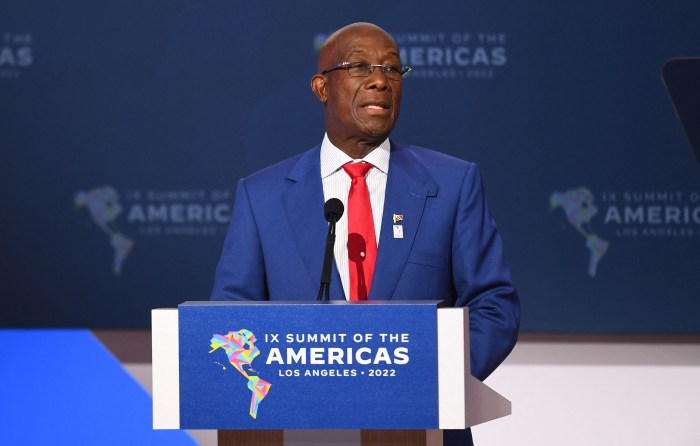Chances are if Speaker John Boehner were asked, he would insist that the obstructionist, do-nothing course he and his Republican/Tea Party confederates have pursued in Congress is “good governance.” No doubt even the noxious upstart Ted Cruz would respond likewise, about his flamethrower tactics not only in the Senate, but as we’ve seen recently, in moves to also be a point man of influence for fellow extremist kooks in the House. Whether any group charged with discharging such duties is practicing “good governance” shouldn’t ordinarily be a difficult call to make, political biases notwithstanding. But, given what constitutes the political terrain, bias does get in the way of hard reality. And the phenomenon is global. In their cockeyed views of good governance, the Boehner or Cruz types on the American landscape are hardly unique in the universe.
A whopper of a claim was recently made by the prime minister of Trinidad and Tobago, Kamla Persad-Bissessar. Announcing, in the midst of a raging firestorm, that the besieged, bombarded minister this time around had resigned, Bissessar incredulously embraced the occasion to note that the man’s exit (the 20th departure from the cabinet over a four-year span, according to the Trinidad Express) was indicative of how much her administration exemplified “the hallmarks of good governance.”
Bissessar is no stranger to hyperbole which, to a greater or lesser extent, is many a politician’s comfort food. A while back, after some inglorious results from a series of election battles in the country served her a generous helping of humble pie, she analogously cited Bill Clinton and Tony Blair as leaders who had a lot tougher mid-term ground to navigate than was earlier the case. The inference that she was as capable as a Clinton or Blair of overcoming any mid-point obstacles is the kind of spin Bissessar obviously finds useful in this period of her government’s treading water. But touting herself as the equal of big-name international players in dialing up the political cunning she and her party will need is much less of a stretch than requesting that an electorate disavow a well established truth.
The prime minister’s reference to the administration she has headed since 2010 as exhibiting the hallmarks of good governance is hubris on a level that engenders speculation about emotional stability. Attempting to foist a “good governance” label for her administration on a public all too familiar with the torrent of corruption with which the regime has come to be identified is so preposterous, one wonders whether an individual in full command of faculties would seriously go there.
Adding to the absurdity was that Bissessar’s comment was no off-the-cuff ad lib. This wacky rationale for chest-thumping was reportedly included in a prepared statement issued after a cabinet meeting. Appropriate deliberation supposedly preceded the offered analysis that, because the prime minister had acted to move 20 misfits and/or miscreants out of her cabinet since assuming office, her administration had thereby cemented its “good governance” creds!
It’s always disconcerting to see some folks in government not realizing that hype is good for a comfy ride but for so long, after which performance alone matters. Not everyone holding elective office has the luxury of a constituent base, as do those far-right members of Congress, which is willing to give a pass to representatives committed to nothing but spewing anti-Obama trash, by way of “accomplishment.” The buzz around Bissessar as the country’s first female prime minister initially ensured her a measure of public benevolence, perhaps more generous than a male would have enjoyed. Even so, a pattern of wrongdoing in high places began manifesting itself unusually early. Not to mention the axing or shifting of individuals in her crew at dizzying speed (reports indicate that when top-level appointees like state enterprise heads are thrown into the mix with cabinet members, the personnel changes number about 30).
Which is to say, never mind the claptrap issuing from Bissessar, the sad fact about governance in Trinidad and Tobago today is that the prime minister and her cohorts have squandered a golden opportunity they were given in 2010, after Patrick Manning’s refusal to acknowledge his full-blown megalomania guaranteed an electoral win for any opponents he faced. Bissessar and company had simply to focus on what Manning pompously did not: prioritizing policies that spoke to the people’s most urgent concerns. Instead, Bissessar’s tenure has been marked by barefaced nepotism, what appears to have been a seamless merge of democracy and kleptocracy and ineptness, symbolized most glaringly by a propensity, as Express columnist Raffique Shah observed, for putting “square pegs in round holes.”
The forward track for Bissessar will assuredly be an emphasis, again, on propaganda and hype, as she mounts an all-out effort to turn public gaze away from the down side of a record in office that has frankly been too in-your-face for attempted obfuscation to succeed. Elections are due in 2015. But more recently, there’s been a new dynamic added to the unfolding drama – Bissessar’s rollout of constitutional changes to impact the upcoming elections. The more cynical among us may recall some constitutional tinkering having ostensibly played a role in elections being postponed in 1955…until ’56.


























